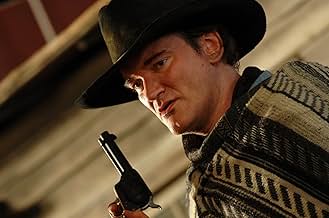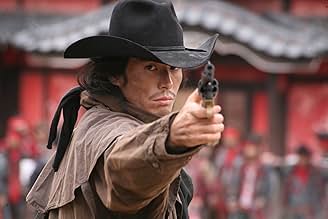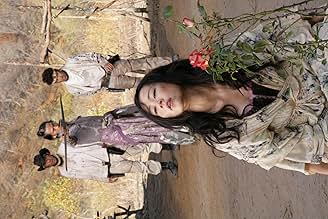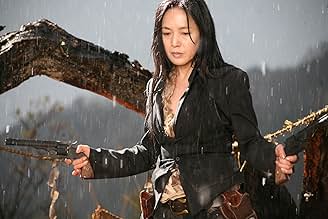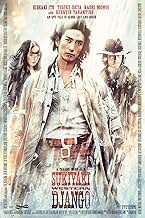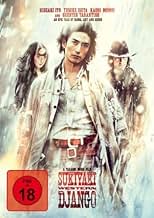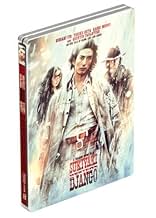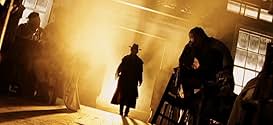CALIFICACIÓN DE IMDb
6.1/10
16 k
TU CALIFICACIÓN
Agrega una trama en tu idiomaA nameless gunfighter arrives in a town ripped apart by rival gangs and, though courted by both to join, chooses his own path.A nameless gunfighter arrives in a town ripped apart by rival gangs and, though courted by both to join, chooses his own path.A nameless gunfighter arrives in a town ripped apart by rival gangs and, though courted by both to join, chooses his own path.
- Premios
- 4 premios ganados y 5 nominaciones en total
- Dirección
- Guionistas
- Todo el elenco y el equipo
- Producción, taquilla y más en IMDbPro
Argumento
¿Sabías que…?
- TriviaThe background for the artificial set in the prologue is clearly inspired by the woodblock prints "Gaifu Kaisei" and "Sanka Haku" featured in Hokusai's famous "Thirty Six Views of Mount Fuji" series.
- ErroresIn the final scene, the Gunman goes from having a mustache and goatee to being clean shaven between shots.
- Versiones alternativasThe international cut version, shorter by 23 minutes, omits several scenes for pacing reasons and also all the scenes where the big Genji/Minamoto henchman after having his balls shot off develops a crush for his leader Yoshitsune. This version was screened at several film festivals and is featured on most of the DVD releases outside of Japan.
- ConexionesReferenced in Django sin cadenas (2012)
- Bandas sonorasDjango ~Sasurai~
Performed by Saburô Kitajima
Written by Makoto (as MAKOTO°), Franco Migliacci and Robert Mellin
Composed by Luis Bacalov (as Luis Enrique Bacalov)
Arranged by Eiji Kawamura
Opinión destacada
Another Mikke Takeshi film - so expect the unexpected - or maybe not.
There is a serious problem to this film which most reviews haven't even touched. Yet anyone who has followed direct-to-video action films from Japan for the past 20 years should know what it is. Post-modern references to Spaghetti Westerns have become such a staple of such films, that these essentially have established a genre all their own - absurdist over the top violence, operatic story elements, musical and visual cues referencing the music of Ennio Morricone and the films of Sergio Leone - This has now been done a hundred times. This is the real surprise (disappointment) of the present movie - it is not new.
The reason for the development of this weirdly self-referential genre is that the most famous of all Spaghetti Westerns, Leone's 'A Fistful of Dollars,' was a direct rip-off of Akira Kurosawa's 'Yojimbo.' In the past two decades, Japanese film makers have tried to understand how that could happen. In general, although producing entertaining action films, they have failed miserably to comprehend the relationship between "Fistful" and "Yojimbo," because they haven't been able to grasp the fundamental agreement between the thought of Leone and Kurosawa which was softly Marxist in social orientation. Both of the original films are quietly but rigorously condemnatory of modern capitalism, which has been lost on the Japanese genre in question.
One would have expected director Miike Takeshi, who has been so critical of modern society in other films, to have recognized this and used it. He does not. SWD is entirely of its genre, and nothing new is learned from it.
Instead, he tries to avoid the issue by drawing his material mainly from the major film by Leone disciple Sergio Corbucci - "Django." Big mistake.
Whatever its merits, 'Django' left one seriously misguided impression on the history of the Spaghetti Western - it seems to be entirely lacking in humor. Althgough Corbucci later revealed quite a sense of the comedic, and Leone's own films are largely comedies with operatic structures, this impression of 'Django' has stuck, and most parodies of Spaghetti Westerns have been based on the assumption that the genre is overly heavy in its themes and philosophy. Nothing could be further from the truth.
Yet here, we are expected to laugh because the characters take themselves sssooo seriously. When the heroes of the best Spaghetti Westerns didn't take themselves seriously at all. Which means we are expected to laugh at a parody of a genre that in fact never existed.
There's a lot of good here. The action sequences are solid, the pacing is good, the weird blend of Meji Restoration and 1880s cowboy actually works visually. And there are lines from the dialog that are impossible to forget.
But those familiar with Japanese action films have seen most of this before. And we expect more from this unique director, especially with the budget involved.
There is a serious problem to this film which most reviews haven't even touched. Yet anyone who has followed direct-to-video action films from Japan for the past 20 years should know what it is. Post-modern references to Spaghetti Westerns have become such a staple of such films, that these essentially have established a genre all their own - absurdist over the top violence, operatic story elements, musical and visual cues referencing the music of Ennio Morricone and the films of Sergio Leone - This has now been done a hundred times. This is the real surprise (disappointment) of the present movie - it is not new.
The reason for the development of this weirdly self-referential genre is that the most famous of all Spaghetti Westerns, Leone's 'A Fistful of Dollars,' was a direct rip-off of Akira Kurosawa's 'Yojimbo.' In the past two decades, Japanese film makers have tried to understand how that could happen. In general, although producing entertaining action films, they have failed miserably to comprehend the relationship between "Fistful" and "Yojimbo," because they haven't been able to grasp the fundamental agreement between the thought of Leone and Kurosawa which was softly Marxist in social orientation. Both of the original films are quietly but rigorously condemnatory of modern capitalism, which has been lost on the Japanese genre in question.
One would have expected director Miike Takeshi, who has been so critical of modern society in other films, to have recognized this and used it. He does not. SWD is entirely of its genre, and nothing new is learned from it.
Instead, he tries to avoid the issue by drawing his material mainly from the major film by Leone disciple Sergio Corbucci - "Django." Big mistake.
Whatever its merits, 'Django' left one seriously misguided impression on the history of the Spaghetti Western - it seems to be entirely lacking in humor. Althgough Corbucci later revealed quite a sense of the comedic, and Leone's own films are largely comedies with operatic structures, this impression of 'Django' has stuck, and most parodies of Spaghetti Westerns have been based on the assumption that the genre is overly heavy in its themes and philosophy. Nothing could be further from the truth.
Yet here, we are expected to laugh because the characters take themselves sssooo seriously. When the heroes of the best Spaghetti Westerns didn't take themselves seriously at all. Which means we are expected to laugh at a parody of a genre that in fact never existed.
There's a lot of good here. The action sequences are solid, the pacing is good, the weird blend of Meji Restoration and 1880s cowboy actually works visually. And there are lines from the dialog that are impossible to forget.
But those familiar with Japanese action films have seen most of this before. And we expect more from this unique director, especially with the budget involved.
- winner55
- 5 ene 2009
- Enlace permanente
Selecciones populares
Inicia sesión para calificar y agrega a la lista de videos para obtener recomendaciones personalizadas
Detalles
Taquilla
- Presupuesto
- USD 3,800,000 (estimado)
- Total en EE. UU. y Canadá
- USD 50,659
- Fin de semana de estreno en EE. UU. y Canadá
- USD 9,856
- 31 ago 2008
- Total a nivel mundial
- USD 2,725,258
- Tiempo de ejecución2 horas 1 minuto
- Color
- Mezcla de sonido
- Relación de aspecto
- 2.35 : 1
Contribuir a esta página
Sugiere una edición o agrega el contenido que falta

Principales brechas de datos
By what name was Sukiyaki uesutan Jango (2007) officially released in India in English?
Responda






